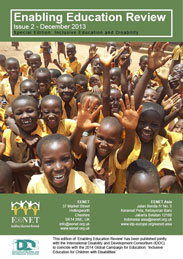Did you know that if you type ‘inclusive education’ as a search in YouTube, it brings up 408,000 results?
Mind blowing! And incredibly confusing for anyone searching for video materials to use in their own inclusive education work. Of course you can use the search function to narrow down the number of results, but there is still an overwhelming range of options. Plus if you are based in Africa, Asia, Latin America or the Middle East many of the films may be irrelevant to the context of your work, as the majority of inclusive education videos found on YouTube were made for American or European audiences.
You could alternatively search through the websites of relevant NGOs and UN agencies, to see if they have made any useful videos. But that’s time consuming too.
So that is why EENET has decided to create a video catalogue. The catalogue will provide a categorised list of a relatively small number of recommended video materials on inclusive education. It will also provide more information about the content of each video, how it could be used and with whom, etc. The recommended videos will be made available through our website, and we hope also on DVD. Depending on the videos we shortlist, we may develop some user guides too.
So, if you have got some favourite inclusive education videos, then we’d like your help with this project! The details can be found below, and we’ll keep you updated with progress.
Thanks!
Ingrid Lewis

What do we need from you?
We need your recommendations of videos about inclusive education!
- You can recommend films that provide an overview of inclusive education, or that focus on specific issues (disability, gender equality, inclusion for other marginalised groups, etc).
— An initial search found many videos do not offer an outline/explanation of what inclusive education is (or what it means to the film maker/organisation).
- You can recommend videos that were created for awareness-raising purposes, or as training materials, and so on.
— An initial search found that many videos talk about specific projects from an awareness-raising/fundraising perspective. Good quality video-based training materials seem less common, so recommendations for the latter would be particularly appreciated.
- We need videos that feature different countries/regions. We mostly want videos that are not filmed in Europe, America, etc, but we’ll probably select a few that are.
— The initial search (excluding material from America and Europe) found a predominance of material focusing on Africa and some parts of Asia and an under representation of Latin America for example.
- We are keen to feature videos that promote participation – for instance, they feature the voices of stakeholders, or were even made by stakeholders.
- We want videos that are interesting and engaging (e.g. not a filmed lecture, unless it is an amazing lecture!).
- Ideally we need films that are subtitled, signed and/or available in other languages, to increase their accessibility.
— An initial search has found that subtitled videos are quite common, but signing and other language availability is less common.
What to send us
- If you don’t have much time, please just email us the website link(s) for your recommended video(s) – or you can share the links here in a blog comment. If the videos are not online, you can send a DVD, CD or VHS copy to the address below; or you could use a Dropbox folder if you want to send us large electronic files.
- If you have a bit more time, please feel free to tell us why you are recommending the video(s), how you or your colleagues have used them, or how you would recommend that they be used, etc.
We will spend the next month or so viewing and assessing videos, and will then create a catalogue of the most relevant/useful. We may ask for some volunteers to review the draft catalogue in a few months, so if you are interested in doing that, let me know.
Deadline for sending recommendations: 7th April (although the catalogue will be updated periodically, so you can send us recommendations at any time after that too!)
Send DVDs etc to:
EENET CIC
37 Market Street
Hollingworth
Cheshire
SK14 8NE
UK
Please email links to online videos to:
ingridlewis@eenet.org.uk
